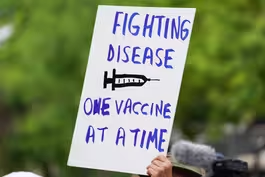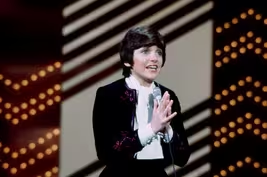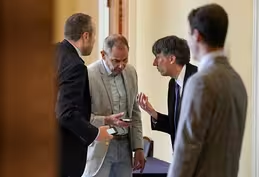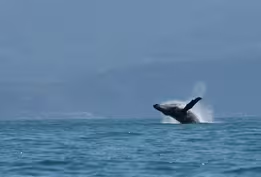
Europe’s top diplomat discusses EU’s relationship with Trump
Clip: 6/28/2025 | 5m 31sVideo has Closed Captions
Europe’s top diplomat discusses EU’s relationship with Trump and next steps for Iran
At this week’s NATO summit in The Hague, Trump declared what was for him unprecedented support for the alliance. Meanwhile, at the European Union summit in Brussels, leaders called for support for Ukraine and diplomacy in the Middle East. Nick Schifrin sat down in The Hague with Kaja Kallas, Europe’s top diplomat, to discuss the relationship with Trump and the path forward with Iran.
Problems playing video? | Closed Captioning Feedback
Problems playing video? | Closed Captioning Feedback
Major corporate funding for the PBS News Hour is provided by BDO, BNSF, Consumer Cellular, American Cruise Lines, and Raymond James. Funding for the PBS NewsHour Weekend is provided by...

Europe’s top diplomat discusses EU’s relationship with Trump
Clip: 6/28/2025 | 5m 31sVideo has Closed Captions
At this week’s NATO summit in The Hague, Trump declared what was for him unprecedented support for the alliance. Meanwhile, at the European Union summit in Brussels, leaders called for support for Ukraine and diplomacy in the Middle East. Nick Schifrin sat down in The Hague with Kaja Kallas, Europe’s top diplomat, to discuss the relationship with Trump and the path forward with Iran.
Problems playing video? | Closed Captioning Feedback
How to Watch PBS News Hour
PBS News Hour is available to stream on pbs.org and the free PBS App, available on iPhone, Apple TV, Android TV, Android smartphones, Amazon Fire TV, Amazon Fire Tablet, Roku, Samsung Smart TV, and Vizio.
Providing Support for PBS.org
Learn Moreabout PBS online sponsorshipNICK SCHIFRIN: Kaja Kallas, thanks very much.
Welcome back.
KAJA KALLAS, Vice President, European Commission: Good to be here.
NICK SCHIFRIN: Let me begin.
In the Middle East, you've declared this is the moment for Iran and the national community to return to the negotiating table.
But a US Official says that the deadlock that existed before Israel's campaign still exists.
The U.S. is demanding that Iran not enrich domestically and Iran is demanding that it does enrich domestically.
So what's the way out?
KAJA KALLAS: Which shows clearly that we need to talk.
It is not only the nuclear that is worrying us, also the missile program, also Iran's attacks, cyber and hybrid attacks on European countries, also their support to Russia in the war against Ukraine.
So diplomacy is the way.
NICK SCHIFRIN: Can U.S. and Israeli military strikes alone end Iran's nuclear program?
KAJA KALLAS: Well, they certainly set it back, but you can't erase the knowhow.
We need to have a clear agreement with them, Iran, because everybody agrees at least in Europe that Iran should not develop a nuclear weapon.
NICK SCHIFRIN: Let's come here to The Hague to the headline out of this summit, of course is an agreement by 32 NATO countries to spend three and a half percent of their GDP on weapons and one and a half percent on defense related items.
That is a unanimous statement coming out of NATO.
Does Europe believe that the US will help defend the continent?
KAJA KALLAS: Well, Article 5 is there and this is the agreement by all the parties.
So, so we don't see any signs that U.S. is stepping away from this.
I want to recall the only time that Article 5 was used was when America asked other allies to come to help.
And the country that I'm from, Estonia, actually had more combat casualties per capita than Americans had.
So, I hope that this is of course also the other way around, that Article 5 applies to all member states, allies.
And so far, you know, America has been saying Article 5 is ironclad.
NICK SCHIFRIN: You just used the word hope.
Can Europe really make plans based on a hope?
KAJA KALLAS: I immediately thought that was wrong.
So sorry about that.
No, I'm sure that America is with us because this is what all the allies have been saying.
Article 5 is ironclad.
NICK SCHIFRIN: There's also concern about how Donald Trump sees Russia itself, whether the United States and Europe or United seen Russia as an adversary.
President Trump once again said he wanted a deal with Russia.
He wanted some kind of normalization with Russia.
Can Europe make plans again for its future defense if the United States isn't with it when it comes to its assessment on Russia threat?
KAJA KALLAS: Well, it is clear how Russia, Iran more covertly, also China, but North Korea are operating together.
And that's why it is of course for us also important to see that we put the pressure on Russia so that they would also want peace.
I mean, over 100 days ago Ukraine agreed to unconditional ceasefire.
And remember, President Trump was very vocal about this, that you know, ceasefire and if he -- if you don't have that, then there are going to be consequences.
NICK SCHIFRIN: But we haven't seen those consequences.
KAJA KALLAS: We haven't seen those consequences.
But the tools are there.
So definitely, I mean, if you compare the reactions and the push for ceasefire in Iran, Israel case, then we would also hope to see the same strength when it comes to Russia.
NICK SCHIFRIN: Part of the pressure on Russia, of course can be economic.
The other part is of course militarily.
Inside Ukraine, the Biden era weapons are now beginning to run out and the Trump administration hasn't given any indication it wants to spend more money to rearm Ukraine.
The E.U.
of course taking huge steps to try and get more weapons, increase defense spending, increased production, but that takes a while.
Is Ukraine vulnerable until then?
KAJA KALLAS: It is of course hard when it comes to weapons systems.
We are doing more than we have done before.
I mean this year only we are already the military support is like 24 billion euros.
So there is still room to go.
NICK SCHIFRIN: And finally this week, Finland, Poland, Estonia, Latvia, Lithuania, of course all NATO and E.U.
members are planning to leave a landmine treaty to mine their borders with Russia to create a so called iron curtain against Russia and Belarus.
What does that say about the threat that Russia poses beyond Ukraine?
KAJA KALLAS: It says the threat is real.
So we really need to do everything to defend ourselves.
And of course all these means, I mean we have been, all these countries have been part of the Ottawa Convention.
NICK SCHIFRIN: The Landmine treaty.
KAJA KALLAS: Yeah, the landmine treaty.
NICK SCHIFIN: Yeah.
KAJA KALLAS: But we are in this situation.
I think the threat that we see coming from Russia, that's why all these countries agree to this.
It shows that this is serious.
NICK SCHIFRIN: Kaja Kallas, thank you very much.
KAJA KALLAS: Thank you.
Former top CDC vaccine expert on why she resigned in protest
Video has Closed Captions
Clip: 6/28/2025 | 5m 53s | Former top CDC vaccine expert on why she resigned in protest over firing of advisory panel (5m 53s)
How comedian Robin Tyler fought for LGBTQ+ rights with humor
Video has Closed Captions
Clip: 6/28/2025 | 4m 49s | How pioneering comedian Robin Tyler used humor to fight for LGBTQ+ rights (4m 49s)
News Wrap: GOP unveils Senate version of Trump’s big bill
Video has Closed Captions
Clip: 6/28/2025 | 2m 9s | News Wrap: Senate Republicans unveil their version of Trump’s big budget bill (2m 9s)
Scientists track humpback whale migration with help from AI
Video has Closed Captions
Clip: 6/28/2025 | 5m 10s | Scientists track humpback whale migration with an assist from AI technology (5m 10s)
Providing Support for PBS.org
Learn Moreabout PBS online sponsorshipSupport for PBS provided by:
Major corporate funding for the PBS News Hour is provided by BDO, BNSF, Consumer Cellular, American Cruise Lines, and Raymond James. Funding for the PBS NewsHour Weekend is provided by...















